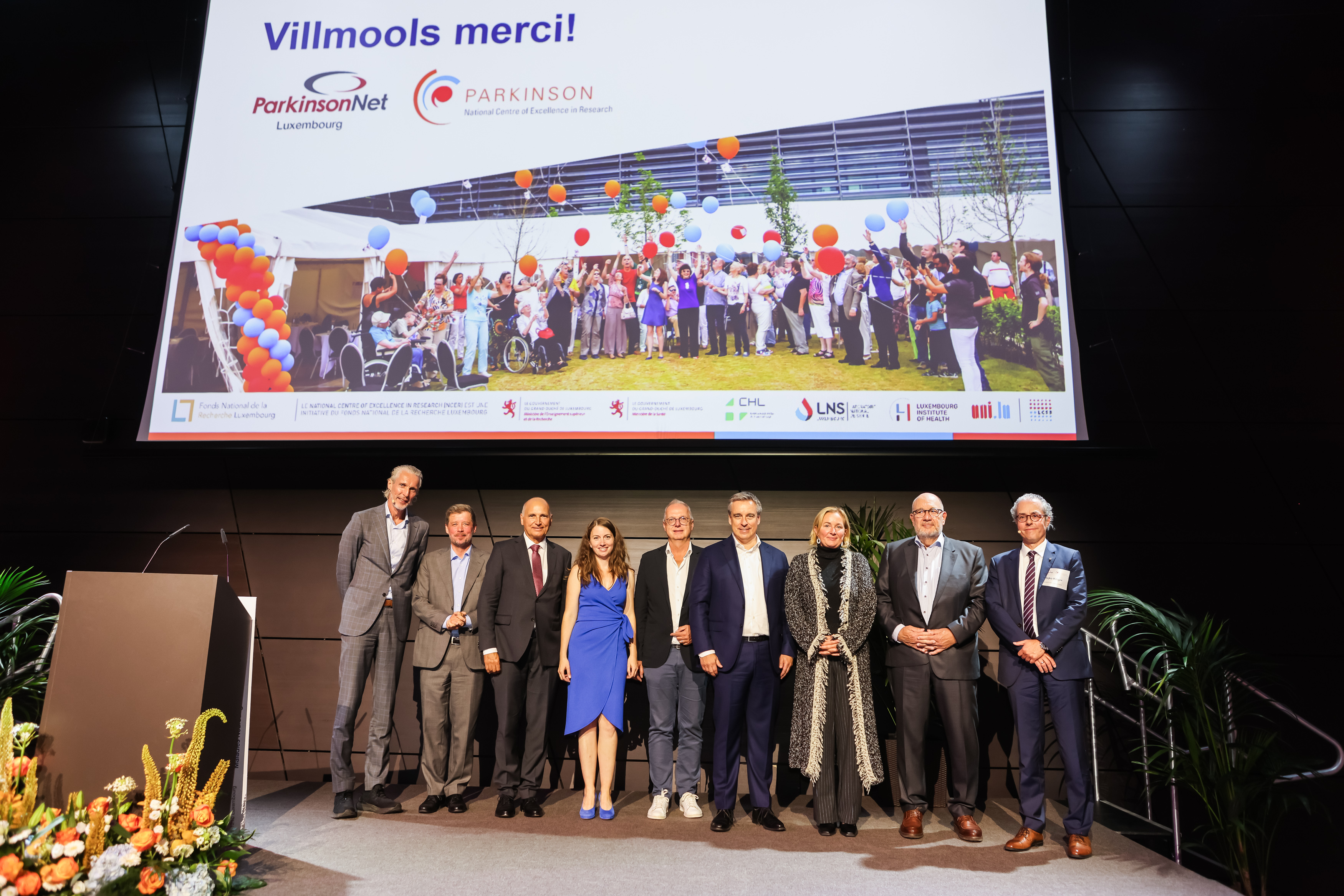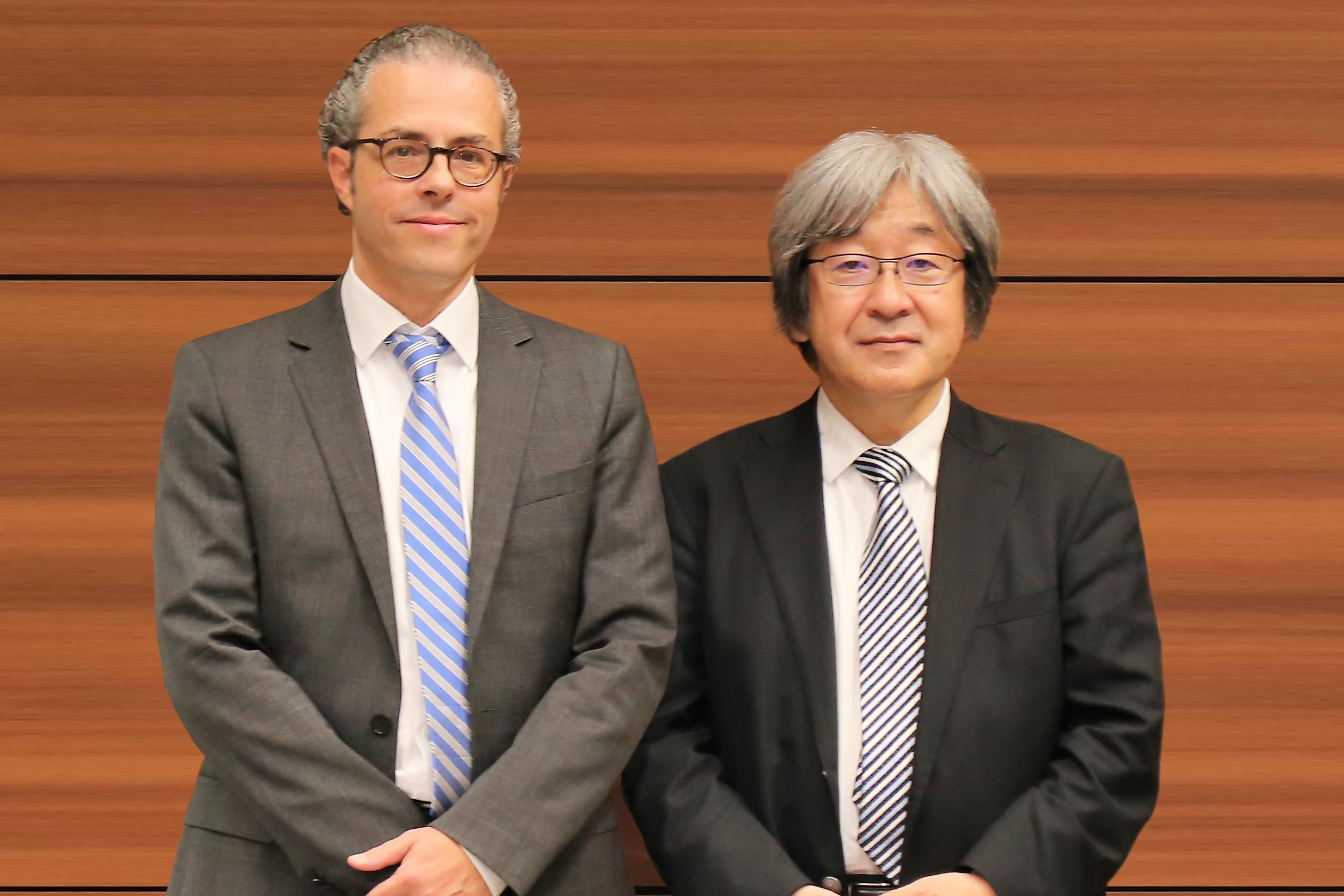
Since 2015, more than 800 people with Parkinson’s disease or other forms of parkinsonism and over 800 healthy controls have participated in the Luxembourg Parkinson’s Study in the frame of National Centre of Excellence in Research on Parkinson’s Disease (NCER-PD) led by Prof. Dr. Rejko Krüger. Participants underwent detailed neurological examinations, neuropsychological tests, and donated multiple body fluids for further molecular and genetic analysis. While people with Parkinson’s were invited to attend annual follow up examinations to gain a detailed insight into the course of the disease, healthy controls were examined every 4 years. More than 20 researchers from the Luxembourg Institute of Health, the Luxembourg Centre for Systems Biomedicine of the University of Luxembourg and the Centre Hospitalier de Luxembourg have contributed to the first comprehensive analysis of the data, which was recently published in the open-access scientific journal Frontiers in Neurology.
Today we talk to Dr. med. Lukas Pavelka, clinician-scientist and neurologist in training, who is one of the first authors of this study:
Dr. Pavelka, what are the aims of the Luxembourg Parkinson’s Study?
Parkinson’s disease is the second most common neurodegenerative disease and the number of patients is expected to dramatically increase in the coming years. A major concern with Parkinson’s disease is that it is usually diagnosed when the disease has already progressed significantly and motor symptoms are apparent. The overall aim of this longitudinal programme was to gain a better understanding of the disease, which will ultimately allow the identification of new methods for the early diagnosis and treatment. Additionally, the spectrum of symptoms in people with Parkinson’s is highly variable and further research is needed to investigate whether multiple subtypes of Parkinson’s disease exist and what lays behind these important differences.
Can you explain what a baseline statistical analysis is and why this is important?
The essence of the clinical research project is to compare the results of the data from the first visit from all people with Parkinson’s and healthy volunteers we have collected at Parkinson’s Research Clinic between 2015-2021. Differences between the patients with different forms of parkinsonism (such as Parkinson’s disease and progressive supranuclear palsy, an atypical form of parkinsonism) and healthy controls can reveal important information that can lead to the discovery of disease patterns. In the future, these findings can then lead to the development of new diagnostic tests or therapeutic approaches that can improve current treatment or diagnosis of the neurodegenerative disorders.
In our baseline analysis, we were looking at many different epidemiological and clinical characteristics between the studied groups. We analysed the profiles of 1648 individuals included in the Luxembourg Parkinson’s study baseline dataset, making it one of the largest single-center study of a kind. It could hence be seen as a very first and comprehensive description of people with Parkinson’s in Luxembourg, highlighting the differences in various aspects of neurodegeneration between the groups.
What are the main findings from the baseline statistical analysis?
When shading light on the differences between the three largest groups of individuals in our cohort, that is Parkinson’s, progressive supranuclear palsy (PSP) and healthy controls, we identified unexpectedly high frequency of loss of smell (hyposmia) in people with progressive supranuclear palsy (PSP). So far it has always been supposed that hyposmia was highly specific for Parkinson’s disease but was not typical for people with atypical forms of parkinsonism, especially PSP. Thus, our study, which analysed a larger number of people with PSP compared to many earlier studies, challenges this current view on lack of hyposmia in PSP.
In addition, we also looked at environmental factors in the context of Parkinson’s disease. For instance, we found a higher rate of occupational use of pesticides in people with Parkinson’s compared to controls in Luxembourg. Moreover, we found alcohol abstinence to be significantly higher in people with Parkinson’s disease compared to controls. One of the explanations for this finding could be the fact that dopamine is known to play crucial role in addiction behaviour. Therefore, the reduction of dopamine levels due to neurodegeneration in Parkinson’s may be responsible for a reduced risk for addictive behaviour, here leading to alcohol abstinence. However, further research is warranted to better understand the link the between those environmental factors and Parkinson’s and we hope to contribute to this knowledge gain through further analysis of the Luxembourg Parkinson’s Study.
What else are the plans for the future?
Our baseline analysis is just the beginning. We are currently analysing many different aspects of this clinically and biologically characterised cohorts in more detail, so further findings and discoveries advancing the research on neurodegeneration are to be expected soon. The baseline analysis is also an important source of information for the international Parkinson’s research community, as it allows other researchers to collaborate on the wealth of data that is available in Luxembourg and cross-validate the findings in the independent cohorts. After all, the fight against Parkinson’s disease is a global one, and we regularly collaborate with researchers and clinicians from abroad by pooling data or samples to analyse specific aspects in several cohorts together. This way, we have an even larger numbers of participants, which allows us to study smaller details with better accuracy, or statistical power as we call it. This principle has for instance been applied in our recent study published in Frontiers in Ageing Neuroscience. Together with partners from Norway, Greece, South Korea and the US, we analysed the progression of Parkinson’s symptoms over time and were able to identify three different of disease progression types (slow, intermediate and rapidly progressing) and the corresponding disease characteristics of those three groups. Being asked to contribute to international studies like this illustrates that the Luxembourg Parkinson’s Study has put the Grand Duchy on the international map, which would never have been possible without the valuable contribution of our participants. We cannot thank them enough for their help in jointly advancing our understanding of the disease.
Reference: Pavelka L, Rawal R, Ghosh S, Pauly C, Pauly L, Hanff A-M, Kolber PL, Jónsdóttir SR, Mcintyre D, Azaiz K, Thiry E, Vilasboas L, Soboleva E, Giraitis M, Tsurkalenko O, Sapienza S, Diederich N, Klucken J, Glaab E, Aguayo GA, Jubal ER, Perquin M, Vaillant M, May P, Gantenbein M, Satagopam VP and Krüger R (2023) Luxembourg Parkinson’s study -comprehensive baseline analysis of Parkinson’s disease and atypical parkinsonism. Front. Neurol. 14:1330321. doi: 10.3389/fneur.2023.1330321
Luxembourg is pulling together its competences on a national scale to provide optimal care for people with neurodegenerative diseases. Following a successful pilot project that ran over the past six years and intregrating the latest scientific advancements from the National Centre of Excellence in Research on Parkinson’s Disease (NCER-PD), the Réseau de compétences maladies neurodégénératives "ParkinsonNet Luxembourg” (RdC-MN) was launched today in the presence of Paulette Lenert, Minister for Health, and Claude Meisch, Minister for Higher Education and Research. Faced with an ageing population and a sharp rise in the number of people living with neurodegenerative diseases, a joint effort between the healthcare system and scientific research is necessary. "With this new network, we are going to ensure that every patient receives the best care possible, based on the latest scientific findings," said Paulette Lenert at the opening of the RdC-MN. "ParkinsonNet will initially be aimed at people with Parkinson's disease and atypical Parkinsonian syndromes. The concept will then gradually be extended to other neurodegenerative diseases.” Neurodegenerative diseases are highly complex. In the case of Parkinson's disease, the causes can be very diverse, ranging from environmental factors to genetic predisposition and lifestyle factors. Moreover, the disease progresses differently in each patient, resulting in distinct sub-groups among those affected. "Because of this complexity, people with neurodegenerative diseases need tailored and personalised care," explains Prof. Rejko Krüger, neurologist and medical coordinator of the RdC-MN at the CHL, professor of translational neurosciences at the University of Luxembourg and director of transversal translational medicine at the Luxembourg Institute of Health. He is one of the initiators of "ParkinsonNet Luxembourg", a concept developed by Prof. Bas Bloem and Dr Marten Munneke of the Radboud University Medical Centre in Nijmegen, which has proven its worth in The Netherlands over many years and has then been tailored to Luxembourg. "To treat neurodegenerative diseases effectively, the different actors within the healthcare sector need to work hand in hand and to always incorporate the latest scientific findings. We have learned together, through ParkinsonNet, that this not only improves patient care but also increases job satisfaction for healthcare professionals." Thus, ParkinsonNet is characterised by a close collaboration between the healthcare professionals involved and by an increased communication with the scientific community. The neurologists, nurses, physiotherapists, occupational therapists and speech therapists who are part of the team systematically exchange information to determine the best ways to care for people with Parkinson's disease. Soon, the network will also include other health professions such as nutritionists and psychologists, as well as social workers. Together, the members of this multidisciplinary team draw up an individual treatment plan tailored to the needs of each patient and taking account of their personal environment. They also regularly attend additional training courses to keep abreast of the latest scientific findings. "It ensures optimal care for patients treated at home as well as in hospital," emphasised Dr Romain Nati at the event. He is the Director General of the Centre hospitalier de Luxembourg (CHL), the main coordinator of the Réseau de compétences maladies neurodégénératives. "We are convinced that the transition between hospital and home care will be facilitated by improved exchanges and closer collaboration between these two worlds as part of the reseau de compétences," continued Dr Nati. "Luxembourg is well positioned, thanks to its eHealth strategy, to ensure the interconnection of the various partners in the healthcare system. With the new RdC-MN, digital support for care management is being implemented for the first time, for the everyday care of people with Parkinson's disease," explains Dr Jean-Claude Schmit, head of the Direction de la Santé. ParkinsonNet is indeed developing new solutions for the digitalisation of the network, together with Prof. Jochen Klucken, FNR PEARL Chair for Digital Medicine. The role of science was also addressed by Claude Meisch, Minister for Higher Education and Research: "Neuroscientific research is making steady progress and Luxembourg is now established internationally as a major player in the field. We are working on an equal footing with leading research institutions, especially through the National Centre of Excellence in Research for Parkinson's disease (NCER-PD). Its success impressively underlines what a research programme of this kind - with a well-defined mission and designed for excellence - can do to complement conventional research. With the new reseau de compétences, the knowledge gained by researchers will now be quickly integrated into patient care in Luxembourg and thus have a direct impact on the daily lives of people with Parkinson’s disease". The Luxembourg National Research Fund (FNR) laid the foundations for the new network by establishing NCER-PD as the first National Centre of Excellence in Research eight years ago. "Thanks to this large-scale research programme, involving many participants from Luxembourg and the Greater Region, with and without Parkinson's disease, we now know much more about this disease," said Marc Schiltz, Secretary General of the FNR. "Luxembourg researchers have acquired new knowledge that will help distinguish between the different forms of the disease, diagnose them more accurately and implement precision medicine strategies.” Prof. Rejko Krüger, who has led NCER-PD since 2019 and will now take the programme into a new phase, agrees: "From our point of view, NCER-PD is a success. I am convinced that thanks to this project, carried out in collaboration with the patients and their families, we have built a strong alliance between research and the healthcare system in Luxembourg, which will also benefit people with other diseases in the future." --- Partner in the RdC-MN: Centre Hospitalier de Luxembourg Hôpitaux Robert Schumann Centre Hospitalier Emile Mayrisch Centre Hospitalier du Nord Université du Luxembourg Luxembourg Institute of Health Société Luxembourgeoise de Neurologie Ministère de la Santé / Direction de la Santé ParkinsonNet International Parkinson Luxembourg asbl Members ParkinsonNet Luxembourg [Currently 71 physiotherapists, occupational therapists, speech therapists and neurologists are members of ParkinsonNet Luxembourg and have completed further training on Parkinson's disease]. --- For more information on ParkinsonNet Luxembourg, please visit www.parkinsonnet.lu. For more information on the National Centre of Excellence in Research on Parkinson's disease (NCER-PD) see the video. Explanations of the most important research successes of NCER-PD over the last 8 years
- The link between a sleep disorder and different forms of Parkinson’s disease
- A global cohort to study genetic Parkinson’s Disease
- The Influence of ageing and small genetic variations on Parkinson’s Disease
- What is cerebrospinal fluid: Interview with Rejko Krüger, neurologist and coordinator of the NCER-PD









